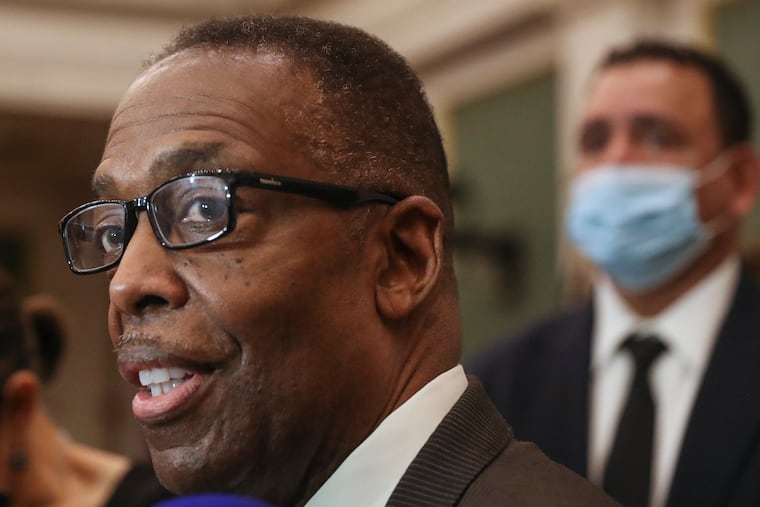Council President Darrell Clarke sued by developer Ori Feibush over North Philly apartment building
Clarke is being sued over an appeal to zoning permits Feibush secured in 2021, which delayed the apartment project and allegedly cost the developer millions.

City Council President Darrell Clarke is being sued for $2 million in damages for his intervention against the zoning approval for an apartment building at 1201 W. Girard Ave.
The project was significantly delayed after Clarke appealed permits granted to developer Ori Feibush, whose project was legal under the zoning and otherwise would not have required any review by the Zoning Board of Adjustment. Feibush contends in the lawsuit that the delay harmed him financially and prevented him from pursing other projects.
“Clarke abused his power to intentionally interfere with plaintiffs’ as-of-right permit and thereby inflicted financial harm … and impeded their ability to develop a property,” the lawsuit reads. “Council President Clarke’s willful misconduct has caused plaintiffs to incur millions of dollars in damages.”
Clarke, Feibush, and the city’s Law Department, which is representing the Council president, all declined to comment about ongoing litigation.
The case revolves around a four-story, 166-unit apartment building Feibush recently completed near North Philadelphia’s Yorktown neighborhood, which was created in the 1960s as a suburb-in-the-city for middle-class Black residents excluded from the city’s surrounding counties.
This part of North Philadelphia saw more suburban style, low-density development through the 1990s — a period that greatly influenced Clarke’s housing politics. Recently, as the city’s population began growing for the first time in 60 years, the neighborhood has seen more multifamily development. Since the pandemic, several such projects have been slated for the six-lane, east-west Girard Avenue corridor that cuts through the area.
Clarke has vehemently objected to the new developments, as have some neighborhood groups.
In June 2021, the same month the zoning board approved Clarke’s appeal of the permits for 1201 W. Girard Ave., the Council president passed a zoning overlay that capped new building heights between Second and Broad Streets on Girard Avenue at 38 feet. That’s about three stories, one shorter than Feibush’s contested apartment building site that falls right in the middle of the newly regulated strip of roadway.
At the June 9, 2021, zoning board hearing at the heart of Feibush’s lawsuit, Clarke said that the area “was clearly intended to be a low-density neighborhood.”
The lawsuit alleges that even though there was no legal basis for the appeal, zoning board members did Clarke’s bidding partly because he intimidated them. The lawsuit claims, “Council President Clarke called at least one ZBA member, demanding the ZBA to rule in his favor.”
The lawsuit specifically cites an instance during the June 9 hearing when Clarke and a ZBA member — then-chairman Frank DiCicco — “suspiciously took a call at the same moment” during the hearing. The lawsuit does not name DiCicco, but he can be seen in a recording answering his cell phone during the hearing, and he confirmed to The Inquirer that it was a call from Clarke.
At the hearing, a lawyer for the city’s Law Department confirmed that there was no legal basis for appealing Feibush’s permits. But a week later, the zoning board approved Clarke’s challenge.
“Council President Clarke directly contacted influential individuals at the ZBA to level threats, corrupt the proceeding, and secure an illicit ruling in favor of his frivolous legal challenge,” the lawsuit contends.
In the interview with The Inquirer, DiCicco said he was not aware of Clarke phoning members of the board outside of the meeting to influence their votes, although he received the call referenced in the lawsuit from Clarke during the hearing in full view of everyone.
But he agrees, in retrospect, that the zoning board’s vote for Clarke’s appeal was wrong because the permits were legal under the existing zoning.
“Sometimes when the board hears from an elected official who’s representing the people, [the ZBA] — myself included at times — lose sight of that,” said DiCicco, a former City Council member who stepped down from his ZBA role in November 2021.
Feibush’s lawyers filed a motion for reconsideration after the board ruled in Clarke’s favor, but a follow-up hearing did not occur for more than four months. The lawsuit also attributes this delay to Clarke’s influence.
“Council President Clarke continued to abuse his power to apply unlawful pressure on the ZBA to avoid it from forming a quorum and/or voting on plaintiffs’ motion for reconsideration,” the lawsuit contends.
DiCicco said he was not aware of such an influence campaign. When the follow-up hearing eventually took place on Nov. 2, 2021, the zoning board ruled eight days later to deny Clarke’s appeal.
DiCicco recused himself because he “had words” with Clarke at the first zoning board hearing over the length of testimony allotted to opponents of the project, but he said that the board voted to reject the Council president’s appeal the second time because the project was clearly legal under the existing zoning.
“That’s why when it was remanded back to the board, it was unanimous” that the appeal be rejected, DiCicco said. “We should never have voted in favor of it [Clarke’s appeal] in the first place.”
The Council president challenged that second zoning board ruling in Philadelphia’s Court of Common Pleas, where the case wasn’t heard for almost a year. On Oct. 24, 2022, the court rejected Clarke’s appeal. Thereafter the project moved forward and was completed this past June.
During the delay, construction costs soared, and interest rates began to rise. The lawsuit contends that as a result of Clarke’s actions, Feibush incurred substantial legal fees and his borrowing costs increased by over $2 million. As a result, Feibush had to personally guarantee the project’s debts, thus reducing his ability to build other projects.
No trial date has been set.